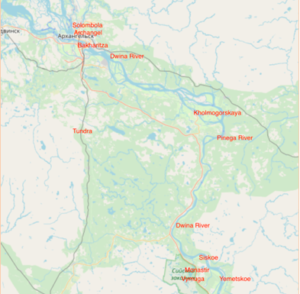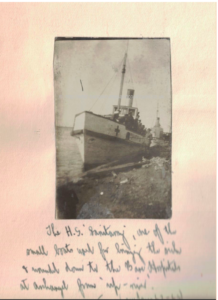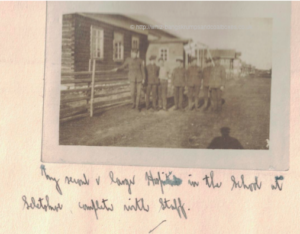Monthly Archives: October 2018
18th October 1918 Friday
After confusion in Archangel Douglas arrives on Solombola Island
All material produced or reproduced here and throughout this work is the sole copyright of the author and the family of Doctor D.C.M. Page MC.
“After a very dismal and cold journey down the Dwina we eventually reached Archangel about 6 p.m. on the 18th. On reaching the wharf I had to hunt about for a hospital to take the wounded to, for there wasn’t a soul meeting the boat. At last I manged to be directed alright to 53rd Stationary Hospital, and after a lot of unnecessary fussing about, and delay about an ambulance, I saw the last of my eleven patients at about 10 p.m. Then I boarded the lugger once more and journeyed further downstream to the island of Solombola where is stationed the nucleus of 85th General Hospital. After a lot of splashing about in mud and water I found the mess, and received a homely Scots welcome from Major Richmond and Capt. Grant. I was dead beat. So ended the first part of my Russian Adventure.”

Map shows the journey from Yemetskoe in the south to Solombola Island in the north © OpenStreetMap contributors
Find out about our connection with Dr Page and an introduction to his diary here
17th October 1918 Thursday
Tea in Yemetskoe and Bugs on Board
All material produced or reproduced here and throughout this work is the sole copyright of the author and the family of Doctor D.C.M. Page MC.
“I left Seletskoe on Thursday October 17th, and was very, very sorry to go. If I had only known that when I got back to Archangel, and found that the 85th General Hospital wasn’t ready for opening, and that I was to be pushed off on another job altogether, I should have remained on in Seletskoe as S.M.O. for I was in my element there. I was hundreds of miles away from all the red, blue and green tabbed gentlemen, and had a most excellent friend and colleague in Lt. Little of the U.S. Army. The first snow of the winter fell to-day, but didn’t lie long. I left Seletskoe about noon on the hospital boat ‘Sanitary’, and took eleven stretcher cases (wounded) with me. I received many small gifts from some of my Russian patients in the place, and had a rousing send off. Turner came with me. We reached Yemetskoe about 4 o’clock (p.m.) after a very pleasant, though cold, trip down the river. At Yemetskoe I met Lt. Heath, Royal Scots, who was commandant, or some such thing, there.
He gave me a very nice tea, and afterwards took me round to meet Lt. Bradbury at the hospital, which proved to be a very cosy little place. Yemetskoe turned out to be quite a large town on the banks of the Dwina. I noticed several large store buildings. We left at 5 o’clock (p.m.) but anchored at dusk as it was very foggy and the captain wasn’t feeling well. The chief engineer very gallantly offered me the use of his cabin for the voyage, which I accepted. I didn’t sleep at all, however, as the bugs were many, and decidedly active!”
Find out about our connection with Dr Page and an introduction to his diary here
16th October 1918 Wednesday
Sanitary Supplies
All material produced or reproduced here and throughout this work is the sole copyright of the author and the family of Doctor D.C.M. Page MC.
“Wednesday morning, the 16th, saw me busy at an early hour. The Hospital Boat, ‘Sanitary’ had arrived up late last night with lots of stores for me. These had to be unloaded first thing. Then I had to dress fifteen wounded whom I sent off to Yemetskoe on the hospital boat. Amongst the stores received were 2 gramophones and numerous records, boxes of books, games, tobacco etc. I wish they had arrived sooner. Capt. Prall arrived from Ripalova in the afternoon, and I handed over the duties of S.M.O. to him. He seems to me to be a queer sort of customer, and I don’t think things will go very smoothly with him. However, Little is in charge of the hospital, so that the sick and wounded will not suffer. A large mail arrived at night for me – 22 letters, and umpteen parcels and papers!”

The H.S. “Sanitary”, one of the small boats
used for bringing the sick and wounded
down to the Base Hospitals at Archangel
from up river
Find out about our connection with Dr Page and an introduction to his diary here
15th October 1918 Tuesday
School Teacher Out of Work!
All material produced or reproduced here and throughout this work is the sole copyright of the author and the family of Doctor D.C.M. Page MC.
“On Tuesday October 15th Little arrived down from the Right Front in great form. He brought some more wounded with him. The young school-mistress paid me a visit at the hospital. She has been on holiday in Archangel, and wanted to know when school would re-open. I told her – when the war was over. She wanted a job in the hospital, but I told her very politely that there was nothing doing. I told her, however, that she might come in in the afternoon, and try to cheer up the Russian patients, who seemed to be a dismal lot of fellows.”

My second and larger hospital in the school at Seletskoe, complete with staff.
Find out about our connection with Dr Page and an introduction to his diary here
14th October 1918 Monday
A Dead Red Unceremoniously Dumped in the River
All material produced or reproduced here and throughout this work is the sole copyright of the author and the family of Doctor D.C.M. Page MC.
“On Monday 14th nine wounded arrived at the hospital including three Bolos. The latter were in a miserable condition. The 3 Bolos., and 4 other wounded arrived down from Ripalova about 11 p.m. It was a wet, pitch-dark night, and it was very difficult work getting the wounded out of the wobbly canoes, and on to stretchers. We took them up to hospital on carts, and to make things worse the back wheels came off one of the carts, and the wounded were precipitated into about 2 feet of mud. There was a dead Bolo. in one of the canoes. I refused to have him removed to my hospital, and as nobody else would have anything to do with him, the canoe was tilted up, and the unfortunate Bolo. disappeared downstream! At night I received a wire from Headquarters ordering me to report back at 85th General Hospital, Archangel at once. I ordered Capt. Prall to return from Ripalova and take over from me.”
Find out about our connection with Dr Page and an introduction to his diary here
13th October 1918 Sunday
A Short Back & Sides and a Scrounged Harmonium
All material produced or reproduced here and throughout this work is the sole copyright of the author and the family of Doctor D.C.M. Page MC.
“Sunday October 13th saw me up at dawn supervising the embarkation of thirty sick and wounded men whom I despatched to Yemetskoe where a new Detention Hospital has been opened with Lt. Bradbury, R.A.M.C. in charge. After getting that little lot off my hands successfully I arranged about sending Capt. Pratt and 2 R.A.M.C. men off on another boat to join Col. Haselden’s Force, and Lts. Dewey and Hutchinson, and 4 R.A.M.C. men to Meijnovskaya to join Lt. Little, and to send him back to Seletskoe to help me, as soon as they had handed over. I was busy all day getting the main hospital, and annexes cleaned up, and ready to receive new cases. The new R.A.M.C. proved to be good chaps. One of them was a 1st class hair-dresser and a chiropodist, and in the evening I had a hair-cut – the first since leaving home! At night we learned that Col. Haselden had taken Shredmairenga with eleven (11) prisoners, and 3 machine-guns. Ten Bolos. were killed, and our casualties were only 4 wounded.
As a result of ‘scrounging’ around in the village I managed to get hold of an harmonium for the hospital, which afterwards proved to be a great boon to all.”
Find out about our connection with Dr Page and an introduction to his diary here
12th October 1918 Saturday
Ready for the Push, Senior Medical Officer Captain Page issues orders
All material produced or reproduced here and throughout this work is the sole copyright of the author and the family of Doctor D.C.M. Page MC.
“Saturday October 12th (see Appendix C*) was a very busy day with me. To-morrow we attack the Bolos., and I was busy getting the place in order for fresh casualties. I had 59 patients in hospital, and was worried because there was no means of getting some of the worst cases off to Archangel, or Emetska. In the forenoon I sent off to Meijnovskaya a Sgt., Cpl. and 4 O.R. with a supply of stores. I hadn’t much to send as supplies were low, and although I had repeatedly written and wired to Archangel for more nothing had arrived. Later on in the day a box labelled ‘Dressings’ arrived, but when I opened it I found it to contain 10 lbs of castor oil! I was furious, and sent off a telegram to the A.D.M.S. thanking him for the castor oil, but saying that drugs and dressings were still urgently needed. When I got back to Archangel later on the D.A.D.M.S. ticked me off for sending such a wire!
In the afternoon a tug arrived with 3 Medical Officers, a Cpl, and 11 O.Rs. R.A.M.C. on board. They were all for duty with me, and I was overjoyed to see them – the Relief of Seletskoe! I explained the situation to them at night, and also held up the tug they arrived on in order to evacuate some of my hospital patients to-morrow.”
* Appendix C available on request. Please email us – ray [at] Londonanduktaxitours [dot] com if you would like to read it.
Find out about our connection with Dr Page and an introduction to his diary here
9th and 11th October 1918 Wednesday and Friday
The Arrival of reinforcements only capable of seated work
And Douglas nabs a spy!
All material produced or reproduced here and throughout this work is the sole copyright of the author and the family of Doctor D.C.M. Page MC.
“On October 9th a sergeant, a corporal and six other ranks R.A.M.C. arrived from Archangel by tug for duty with me. They were all B. 111 category and looked it too!
On Oct. 11th I had to make more room for convalescent patients so took over another empty house of four good-sized rooms just opposite No. 1 Convalescent House. The Americans have christened the former Hickey’s Hotel, and the latter is already named Myersville – Hickey and Myers being the American orderlies in charge.
I assisted at the capture of an alleged spy in the forenoon. He was a released Russian prisoner of war, and had been in Frankfurt for the last two years. Since he arrived in the village we noticed that he disappeared for a day or two at times, and nobody knew where he went to. When arrested he could not give a satisfactory explanation. We were led to believe that he had been given money by the Germans, when they released him, to spy on us for the Bolsheviks. He was an accomplished water-colour artist, and showed us some excellent paintings done by himself whilst at Frankfurt.
A batch of twenty Americans arrived from ‘up the line’ in the afternoon suffering from so-called ‘trench feet’. I diagnosed the complaint as ‘cold feet’ and ticked them off. On the ‘phone Little said that he thought there was a yellow streak in them.”
Medical officers classified the condition of men as they were examined on enlisting. General Ironside made much of the poor category of soldier that had been sent to Northern Russia and below is a chart of those categories.
| A | Able to march, see to shoot, hear well and stand active service conditions. Subcategories: |
| Al | Fit for dispatching overseas, as regards physical and mental health, and training |
| A2 | As Al, except for training |
| A3 | Returned Expeditionary Force men, ready except for physical condition |
| A4 | Men under 19 who would be Al or A2 when aged 19 |
| B | Free from serious organic diseases, able to stand service on lines of communication in France, or in garrisons in the tropics. Subcategories: |
| Bl | Able to march 5 miles, see to shoot with glasses, and hear well |
| B2 | Able to walk 5 miles, see and hear sufficiently for ordinary purposes |
| B3 | Only suitable for sedentary work |
| C | Free from serious organic diseases, able to stand service in garrisons at home. Subcategories: |
| Cl | Able to march 5 miles, see to shoot with glasses, and hear well |
| C2 | Able to walk 5 miles, see and hear sufficiently for ordinary purposes |
| C3 | Only suitable for sedentary work |
| D | Unfit but could be fit within 6 months. Subcategories: |
| Dl | Regular RA,RE, infantry in Command Depots |
| D2 | Regular RA,RE, infantry in Regimental Depots |
| D3 | Men in any depot or unit awaiting treatment |
Find out about our connection with Dr Page and an introduction to his diary here
7th and 8th October 1918 Monday and Tuesday
Preparations for a Big Push
All material produced or reproduced here and throughout this work is the sole copyright of the author and the family of Doctor D.C.M. Page MC.
“During the next two days everybody was very busy preparing for the ‘push’ which is supposed to come off on Saturday. Telephone wires were laid across the river to Ripalova, and a wireless was put up in the village. Needless to say this caused a great sensation amongst the villagers. I busied myself getting reserve supplies of dressings cut up ready for use. Col. Henderson left for Archangel on the 7th – a good riddance too!”
Find out about our connection with Dr Page and an introduction to his diary here
6th October 1918 Sunday
Substandard Soldiers Inspected by Col. Gavin
All material produced or reproduced here and throughout this work is the sole copyright of the author and the family of Doctor D.C.M. Page MC.
“On the morning of Sunday, October 6th, I attended the inspection of the Royal Scots by Colonels Gavin and Haselden. Col. Gavin spoke to each man, and I told him each man’s disability for which he had been categorised at home. In spite of the fact that they were such a poor lot physically, Col. Gavin told them that they would have to do their bit – and they were told at home that they were only coming out to garrison Archangel! In the afternoon they went off to Ripalova. The signal people got a telephone wire fixed up to Meijnovskaya by evening. There were nine admissions to hospital during the day – no serious cases.”
Find out about our connection with Dr Page and an introduction to his diary here